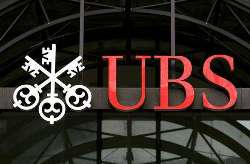UBS shares up after deal, government profits on bank exit
 Geneva - Shares in UBS AG closed up Thursday on the Zurich exchange, a day after it was announced the bank would divulge information to US tax authorities on 4,450 accounts and the Swiss government said it would exit its investment in the bank.
Geneva - Shares in UBS AG closed up Thursday on the Zurich exchange, a day after it was announced the bank would divulge information to US tax authorities on 4,450 accounts and the Swiss government said it would exit its investment in the bank.
The stock closed at 17.50 francs, up 4.54 per cent on the day.
The Swiss government, meanwhile, exited its investment in the bank, selling off the roughly 9-per-cent stake in UBS it obtained last year as part of a bailout for the troubled institution.
The sale of the government's 332.2 million francs in mandatory convertible notes, combined with interest UBS would pay Bern, earned the government a profit of 1.2 billion Swiss francs (1.12 billion dollars), it announced in a statement.
The government said the deal with the US, which would see the bank hand over details on accounts which historically benefited from an almost absolute veil of secrecy, combined with the capital UBS raised last month, allowed it to end its investment while being certain of the stability of the institution.
"UBS has a stable, sound capital base," Finma, the Swiss regulator, said in a statement welcoming the government's sell-off.
While still reporting losses this year, the bank said in its second quarter results that its Tier 1 capital ratio was improving, a sign of regulatory health. It would likely use some of this capital to pay back the government.
The US had originally demanded details on up to 52,000 accounts, but went after the largest fish in the end. The 4,450 accounts are estimated to hold some 18 billion dollars, on which the clients are alleged to have not paid their taxes to the US.
The agreement includes a stipulation that the summons against UBS in the US court system would only be withdrawn after Washington received information on 10,000 accounts.
The full details of the deal will be made public in 90 days.
The deal with the US was generally perceived as a good outcome in the Swiss media Thursday, with analysts noting the resolution could have been much worse and much more drawn out.
However, many papers pointed out some of the catches to the deal. In one case, the Geneva-based Le Temps ran an editorial on the front page called the "American victory" next to a large cartoon showing a banker visiting a client in jail, while the caption read: "Thank you for choosing UBS."
The first catch skeptics noted was that the Swiss government left the door open for more demands from the US for information on other accounts, possibly at other banks.
As part of the deal UBS would encourage its clients to come clean with the US authorities. An existing programme in Washington, meant to enable tax evaders to pay up and avoid jail, has already lead to more information on where people hid assets.
Analysts were still questioning how much legal risk UBS would be exposed to, as its clients told all to US authorities.
Also, Swiss analysts noted, the deal allows for the Internal Revenue Service to ask for data even if it does not have the client name, a practice known as a "fishing expedition."
Some papers noted that UBS had acted illegally in trying to help clients evade taxes, weakening Switzerland's position in the negotiations as it tried to uphold banking secrecy.
On the other hand, the transfer of data would be generally in line with a wider interpretation of Swiss laws.
The Swiss SMI index as a whole was up 0.86 per cent at the close.
UBS's cross-town rival, Credit Suisse - the largest Swiss bank by market capitalization - closed at 52.50 francs, higher by 0.38 per cent in Thursday's trading.
Julius Baer, another large bank whose name has been mentioned in regards to future investigations, closed at 48.64 francs, up 0.87 per cent, with low volume. (dpa)